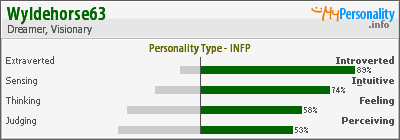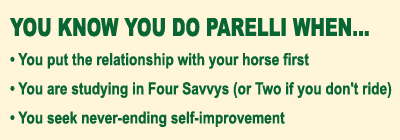06.12.03
But Can You Ride Other Horses?
Somebody asked me a very pointed question today: "How will PNH prepare you to ride non-PNH horses? Will you be able to?" I have to admit that it caught me so off-guard that I had to sit down and think it through. Following is my answer to them:
Absolutely! In fact, you will probably get a much better ride than your non-PNH counterparts, even if it's "just" an old nose-to-tail string horse on a trail ride. There are two parts to PNH: teaching the human, and teaching the horse. PNH teaches the human to ride the horse, not the saddle, the discipline or the style. Horses don't know whether they are PNH or not, but they DO know if you've got savvy and how much of it.
Most people's knowledge of horses is limited to the very basics; they are told "kick to go, pull back to stop, steer with the reins, cluck once for a walk, twice for a trot and kiss to canter." The sad thing is, even THAT information is incorrect to some extent. There is so much more to horses and riding than most people realize, but somehow they manage to stay alive through the experience anyway.
The part of PNH that is geared toward the human teaches the philosophy and theory of horsemanship and how to communicate with a horse in their own language, the way another horse would. You learn how a horse thinks, what drives and motivates him, what scares him, what causes him to react the way he does. You also learn how to counteract the human's inherent predator-like behavior by adjusting your behavior to mimic that of the horse (prey animal).
It's a lot like the difference between paint-by-numbers vs. painting by color theory. Anyone can paint by numbers; they know that red and blue make purple, and the end result is a decent painting, but they don't necessarily understand why these colors blended together the way they did to create the image. But someone who has studied color theory and painting techniques will understand how to use the paint color's inherent properties to their advantage—for example they'll know why certain colors make things appear closer in the painting or farther away, how to create realistic highlights and shadows, and how to blend colors to get the exact shade of green they want. It's a more refined understanding of painting. Likewise, PNH provides the human with a more refined understanding of horse behavior and horsemanship that goes way beyond the basics.
What PNH teaches the human about horses applies to each and every horse you will come into contact with. To ride a horse effectively, you need to be able to balance well; ask them to change or maintain gaits and speed; ask them to steer, go and stop; and ride all the gaits comfortably. You get bonus points if you've had some traditional riding lessons (even years of dressage) and can also anticipate through their body language what they might do next, or be able to ask more advanced questions such as changing leads or negotiating a jump. Still, this accounts for only about 1% of what PNH teaches the human about horses. The other 99% makes the difference between a novice and a true horseman.
What PNH teaches the horse is pretty much the same things that are traditionally taught when "breaking" a horse, but it's done as naturally as possible—how to respond off of pressure, follow a feel, pick up leads, change/maintain gaits, steer, stand still... the list is endless. The less equipment used, the better; PNH relies on communication and body language, not gadgets.
Really, the only difference between a PNH-trained horse and a non-PNH horse is the level of responsiveness from the PNH horse and the bond that is established with his rider. The PNH horse has been educated to respond more off of less pressure. The PNH student has worked with their horse or horses to establish a very strong bond of safety, communication, trust, and respect and has refined it to a razor-sharp level.
PNH will prepare you to ride any horse, anywhere, at anytime, and the further you go into the program the more prepared you will be for any situation that you may encounter. You will know how to read any horse's body language so acutely as to be able to head problems off before they start, help the horse overcome fears in mere moments that may have plagued them for years, and although the horse may require more pressure or more deliberate signals before he responds, he will certainly appreciate the politeness with which you ask and the savvy that you display when you communicate with him.


No comments:
Post a Comment